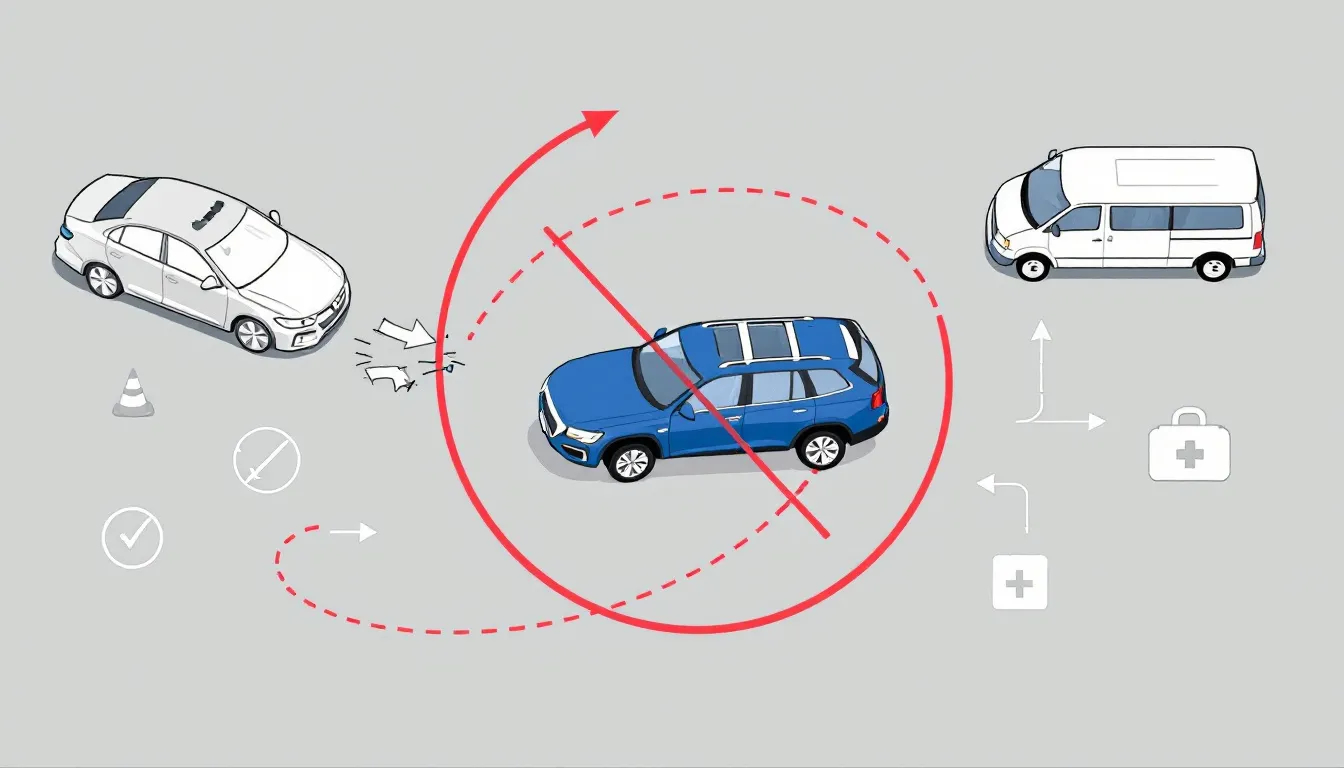What Is a No-Fault Accident and Who Pays?
A no-fault accident is a type of car accident where each driver’s car insurance covers their own medical costs and lost wages, regardless of fault. In this article, we will explain what is a no-fault accident, how no-fault insurance works, its benefits, exceptions, and the steps to take if you are involved in such an accident.
Key Takeaways
- A no-fault accident ensures that each party’s insurance covers their own medical expenses and lost wages, eliminating the need to determine fault.
- No-fault states require drivers to maintain Personal Injury Protection (PIP) coverage, facilitating quicker access to necessary medical treatment and financial support.
- While no-fault systems simplify claims processing, they allow lawsuits for serious injuries beyond standard coverage, highlighting the importance of understanding state-specific regulations and seeking legal guidance.
- No-fault auto insurance is mandatory in certain U.S. states and Puerto Rico, ensuring that drivers have coverage for medical expenses and lost wages regardless of fault.
Understanding No-Fault Accidents

In the event of a no-fault car accident, liability for damages is not contingent on identifying the responsible party. The essence of the no-fault system differs from traditional systems where only the insurance of the at-fault driver is accountable for paying out damages. Under no-fault, each involved individual’s own insurance policy provides coverage for their medical costs and missed income regardless of who caused the mishap. This method aims to streamline and accelerate claim settlements while reducing conflict between parties.
In no-fault insurance states, it is important to follow specific procedures after an accident to ensure proper compensation.
States that operate under this system, like Michigan, require drivers’ insurance policies to include Personal Injury Protection (PIP). PIP encompasses expenses such as:
- Healthcare fees
- Lost earnings
- Funeral costs
- Substitute services
Subsequently, if an accident occurs, you submit a claim with your own insurer to pay these charges without considering whether you are liable or not.
Notwithstanding its intention to simplify claims processing, there are those critical of how it restrains one’s ability to pursue legal action over pain and suffering unless severe injuries have occurred. Yet, its primary benefit is still acknowledged: individuals acquire prompt compensation without needing proof of blame, which can facilitate quicker recuperation from their misfortune.
No-Fault Insurance Explained
No-fault insurance, also known as Personal Injury Protection (PIP), is an auto insurance policy feature that covers medical expenses and lost income in the event of a car accident, irrespective of who is at fault. No-fault auto insurance is mandatory in certain U.S. states and Puerto Rico, ensuring that drivers have coverage for medical expenses and lost wages regardless of fault. Drivers in no-fault states are mandated to carry a basic amount of PIP coverage to ensure everyone involved in an accident receives prompt protection.
The main advantages of having no-fault coverage include swift payment for your medical bills, reimbursement for missed wages due to injury from the accident, travel expenditures associated with doctor appointments, and compensation for necessary personal care services. This form of coverage helps avoid the time-consuming disputes often seen when determining fault in traditional insurance claims. It guarantees quick access to needed healthcare services and financial support essential during recovery periods.
Nevertheless, it’s critical to understand that no-fault policies usually provide limited benefits which may not suffice all out-of-pocket costs stemming from an incident. Thus scrutinizing your auto insurance plan thoroughly and contemplating additional optional coverages could be key strategies for achieving full-scale protection against various losses experienced after accidents occur. Being well-versed in the details of your PIP scheme along with understanding how you should proceed with lodging a claim under this type of no-fault system can offer significant assistance while handling situations following mishaps on roads.
List of No-Fault States
Presently, there are ten no-fault insurance states within the United States that adhere to the no-fault insurance system. These states include Florida, Hawaii, Kansas, Kentucky, Massachusetts, Michigan, Minnesota, New York, North Dakota and Utah.
In such no-fault states – irrespective of who is deemed at fault for an accident – individual drivers’ insurance policies cover their own medical costs and any income they may lose as a result of the incident.
Noteworthy is that both New Jersey and Pennsylvania offer distinct options pertaining to no-fault insurance, which can affect coverage decisions for those driving from other areas. Being aware that your home state operates under a no-fault system or whether you’re passing through one is essential in ensuring adequate coverage while also preparing oneself for procedures following potential accidents.
How No-Fault Insurance Works
In states that operate under no-fault insurance, when a car accident occurs, drivers file claims with their respective insurance companies for coverage of medical bills and income lost due to the accident. In no-fault states, individuals must use their own car insurance for compensation regardless of fault. This happens regardless of who is at fault. The intent behind this system is to simplify how people are compensated and relieve the legal system from excessive caseloads.
It’s crucial for individuals in these no-fault jurisdictions to abide by the guidelines set forth by their insurance provider during a claim submission process. Insurance firms may demand an official statement recounting details of the collision or insist on conducting a medical assessment through an approved doctor. Not following these stipulations can lead to your claim being rejected.
As such, within no-fault states, it’s your own vehicle insurer who will take up the responsibility for covering costs associated with medical care and compensation for any wages you’ve missed out on as a result of your involvement in an auto accident. This arrangement ensures expedited financial relief without becoming entangled in extensive legal battles so you can concentrate on recuperating.
Insurance Coverage and Limits
In a no-fault state, insurance coverage and limits play a crucial role in determining the compensation for accident victims. No-fault insurance policies typically cover medical expenses, lost wages, and other related costs, regardless of who was at fault in the accident. The coverage limits vary from state to state, but most no-fault states require drivers to carry a minimum amount of Personal Injury Protection (PIP) insurance.
For instance, in Michigan, drivers can choose from different levels of PIP coverage, including unlimited, $500,000, $250,000, or $50,000. The level of coverage selected will determine the amount of compensation available for medical expenses and lost wages. It’s essential to review your auto insurance policy to understand the coverage limits and ensure you have adequate protection in case of an accident. By doing so, you can safeguard yourself against unexpected financial burdens and ensure that you receive the necessary support during your recovery.
At-Fault vs. No-Fault Insurance Systems
At-fault and no-fault insurance systems are two different approaches to handling car accidents and providing compensation to victims. In an at-fault system, the driver who is determined to be at fault in the accident is responsible for paying for damages, including medical expenses and property damage. This often involves a lengthy process of determining fault and negotiating with the at-fault driver’s insurance company.
By contrast, a no-fault system simplifies the process by allowing each driver’s insurance company to pay for their own losses under their policy, regardless of who was at fault. This means that in no-fault states, drivers can quickly access compensation for medical expenses and lost wages without the need to prove fault. However, no-fault systems often have limitations on the amount of compensation available and may not provide adequate coverage for serious injuries or significant property damage. Understanding the differences between these systems can help you make informed decisions about your insurance coverage and how to proceed after an accident.
Exceptions to No-Fault Rules
In no-fault insurance systems, the process for making claims is meant to be straightforward. Under specific conditions, legal action can still be taken. In jurisdictions that adhere to no-fault regulations, individuals are permitted to pursue litigation against the driver responsible for an accident when dealing with severe injuries or suffering considerable economic loss beyond what is covered by their insurance.
The definition of a serious injury that justifies such lawsuits differs from state to state but often encompasses major disfigurement, bone fractures, or irreversible impairment of bodily functions. To substantiate your claim in these instances, it’s imperative you gather concrete proof including healthcare documentation and accounts from witnesses.
Grasping these exemptions holds significant importance if you’re faced with inadequacies in your no-fault coverage following an incident. Seeking advice from a legal professional can illuminate whether pursuing compensation through court proceedings applies to your situation and advise you on the next steps.
Steps to Take After a No-Fault Accident
Directly after an incident involving no-fault insurance, it’s imperative to evaluate the surroundings and ascertain whether anyone is injured. It’s vital to get medical attention even if you initially feel unscathed because certain injuries might not manifest right away. Swift documentation of any harm sustained is critical for your no-fault insurance claim, as this data can be decisive.
At the accident scene, compiling evidence should also take precedence. Exchange contact information and relevant insurance details with the other party involved in the collision and secure testimony from onlookers if possible. Such proof will prove indispensable when submitting your claim and can aid in achieving a fair settlement.
It’s equally important to alert law enforcement about the occurrence of an accident. The official account detailed within a police report can serve as substantial support during dealings with insurers.
After returning home, promptly jot down every aspect pertaining to the car accident while they remain vivid in memory. Engaging with a legal professional who specializes in car accidents soon can provide valuable insights into navigating through claims procedures while safeguarding your entitlements.
Filing a No-Fault Insurance Claim
When filing a no-fault insurance claim, it’s essential to follow the correct procedures to ensure timely and adequate compensation. For example, in Michigan, drivers must file an application for no-fault benefits with their insurance company within one year of the accident. This application should include documentation of medical expenses, lost wages, and other related costs.
To ensure a smooth claims process, keep detailed records of all correspondence with the insurance company, including dates, times, and details of conversations. If the insurance company denies your claim or offers inadequate compensation, you may need to seek the assistance of a personal injury attorney to negotiate a fair settlement or file a lawsuit. In fact, we encourage you to consult an attorney prior to submitting a claim, as it will help you to submit a comprehensive, well-supported claim (and give your attorney the opportunity to advocate on your behalf). By understanding the steps involved in filing a no-fault insurance claim, you can better navigate the process and secure the compensation you deserve.
Consequences of a No-Fault Accident
A no-fault accident can have significant consequences, both financially and emotionally. In addition to medical expenses and lost wages, accident victims may experience pain and suffering, emotional distress, and long-term disability. These impacts can affect your ability to return to work or engage in activities you enjoyed before the accident.
In Michigan, no-fault accident victims may be entitled to compensation for excess economic losses, including medical expenses and lost wages, above the limits of their PIP coverage. They may also be able to sue the at-fault driver for pain and suffering if they can prove that the other driver’s negligence caused the accident and resulted in serious injuries. It’s essential to seek the advice of a personal injury attorney to understand your rights and options after a no-fault accident. By doing so, you can ensure that you receive the full compensation you deserve and navigate the recovery process more effectively.
Traveling in a No-Fault State
Should you be involved in an accident within the confines of a no-fault state, it is imperative to understand that the no-fault system dictates you file a claim with your own insurance company. This holds true regardless of your home state and aims to address any medical bills or compensation for lost wages incurred due to the accident.
It is critical to recognize that your coverage under no-fault insurance remains valid across state lines, provided it aligns with the legal minimum requirements for insurance. Bear in mind, that certain states such as New Jersey and Pennsylvania offer distinct variations of no-fault insurance which could potentially influence how coverage applies if you are not a resident driver. Having knowledge about these specific stipulations can significantly aid in managing an accident’s consequences more efficiently.
Impact on Driving Record
The impact of a no-fault accident on one’s driving record is not always immediately apparent. Despite being labeled “no-fault,” claims resulting from these accidents can linger on a driver’s record for a duration ranging between three to five years, which has the potential to influence insurance premiums within that period. While no-fault systems are designed with the intention of protecting drivers against premium increases following an accident, there are particular instances and varying policies among insurers that may nevertheless result in unexpected rate escalations.
Various factors play into how insurance rates might be affected after such incidents. These include the individual’s prior driving history, how often they’ve filed claims, as well as the gravity of the no-fault accident itself. As such, it is crucial for drivers to grasp how their involvement in no-fault claims could bear consequences on both their driving records and subsequent insurance costs over time.
Who Pays for Car Damage?
In states that operate under no-fault insurance, the driver responsible for an accident is liable for any vehicular damage incurred. No-fault insurance policies provide coverage for medical costs and lost income. They do not extend to cover property damage. For such cases, car owners rely on their car insurance’s property damage liability protection to secure reimbursement for damages inflicted upon another person’s vehicle during a collision.
When seeking remuneration for vehicular harm, one must initiate a claim with the at-fault driver’s insurer. This process tends to be more complex than submitting a no-fault claim since it necessitates establishing the culpability of the other motorist. A solid grasp of your own insurance particulars and adeptness in navigating claims can greatly alleviate potential stress and financial strain following an accident.
Importance of Legal Guidance
Dealing with the intricacies of no-fault insurance claims can be quite complex, and legal assistance can prove to be essential. Acquiring legal advice following a no-fault accident is crucial for understanding your entitlements and securing just compensation. A lawyer well-versed in these matters can shed light on your insurance policy specifics and guide you through the process of filing claims.
Numerous lawyers provide free initial meetings, giving you an opportunity to discuss your situation without any financial obligation. Engaging with an attorney knowledgeable about no-fault accidents increases the likelihood of achieving a positive resolution to your case.
Reaching out to organizations such as 1-800-THE-LAW2 is beneficial for locating an attorney who offers a free consultation service.
Summary
In summary, it is essential for drivers to have a clear grasp of no-fault accidents and related insurance coverage. These systems are designed to streamline the claims procedure, allowing for quick access to funds covering medical costs and compensation for any earnings lost without the need to establish who was at fault in an accident. Being familiar with specific details, exceptions, and actions required post-accident can greatly influence your path toward recovery as well as your financial stability.
It’s important that you take active steps toward understanding your own insurance policy and not hesitate to seek legal advice when necessary. Armed with appropriate information and professional support, tackling the consequences of a no-fault accident becomes manageable, ensuring you retain control over your situation while maintaining tranquility.
Frequently Asked Questions
A no-fault accident allows each party involved to receive compensation for medical expenses and lost wages through their own insurance, irrespective of fault.
This approach simplifies the claims process and reduces legal disputes.
No-fault insurance primarily covers medical expenses, lost wages, travel costs for doctor visits, and attendant care through Personal Injury Protection (PIP). It ensures that you receive these benefits regardless of who is at fault in an accident.
The no-fault states in the U.S. are Florida, Hawaii, Kansas, Kentucky, Massachusetts, Michigan, Minnesota, New York, North Dakota, and Utah.
This means that in these states, drivers can file claims with their own insurance regardless of who is at fault in an accident.
Yes, in no-fault states, you can sue for pain and suffering if your injuries are deemed serious and meet specific legal criteria.
In a no-fault state, each driver’s insurance covers their own car damage, regardless of who is at fault.
Therefore, you would seek compensation through your own insurance policy.




